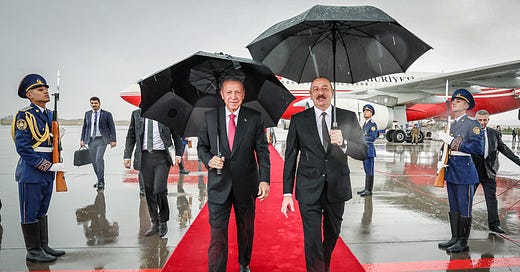If they say Yerli ve Milli, we say Snoop TOGG and Maykıl Skot.
If they say Pizza Hut and The Atlantic, we say Dayı Kürek Lahmacun and Turkey recap. E-macun the possibilities. Today we cover:
Turkey’s deepening links to the Caucasus
Özel’s prospects for CHP leadership
Menendez trials and celebrations
Rulings of a ByLock era
Şimşek’s plea for patience
And a satanic influencer’s journey to Mecca
Also, do read our latest reports on Turkey’s highly-organized anti-LGBT movement by Ingrid Woudwijk and post-quake Hatay’s subsistence bakers by Gonca Tokyol and Ingrid Woudwijk, in collaboration with Culinary Backstreets.
Three years ago today, Azerbaijan reclaimed territories in and near Nagorno-Karabakh – an area internationally recognized as part of Azerbaijan, but with a historic, majority ethnic Armenian population.
On Sept. 19, Baku launched another offensive, taking control of the region within 24 hours and commencing regional reintegration talks, which is where Turkey comes in. Pres. Erdoğan visited his Azerbaijani counterpart İlham Aliyev Monday.
Though he stated Turkey played no part in the latest military operation, Erdoğan praised Baku’s victory, suggesting it could open the way to normalizing relations in the Caucasus.
Erdoğan went on to say Armenia was paying the price for the mass killing of Azerbaijani civilians in the 1992 Khojaly Massacre, as media reports focused on the mass movement of displaced Karabakhis to Armenia.
Authorities calculate more than 50,000 have fled the region so far and about 28,000 have arrived in Armenia, as the nation’s Prime Min. Pashinyan and several international organizations warn against ethnic cleansing.
The Aliyev-Erdoğan meeting took place in the autonomous exclave of Nakhchivan, which borders Iran and Turkey and is separated from the rest of Azerbaijan as alternatively described in this Alizade song.
Azerbaijan now looks to restore transport links to Nakhchivan through the Zangezur Corridor through Armenian territory despite objections from Yerevan. Turkey supports the corridor plan as Iran also reportedly views the development as positive.
"We expect a comprehensive peace agreement between the two countries as soon as possible and for promises to be quickly fulfilled, especially on the opening of the Zangezur corridor," Erdoğan told the UN General Assembly last week on the day the military operation began.
As explained in this CATS analysis, Baku counts on Ankara for its military support and in return Azerbaijan serves as an entry point for Turkey to the South Caucasus and Central Asia, or the rest of the “Turkic world.”
“There is no deterrence and little real incentive for Azerbaijan to stop now. Rather it is more likely to only continue its reliance on military force to resolve the Nagorno-Karabakh conflict,” Richard Giragosian, director of the Yerevan-based Regional Studies Center, told Turkey recap.
For one thing, Azerbaijan’s latest victory will alter the dynamics in the geopolitical landscape, according to Giragosian, including Turkey-Armenia normalization efforts which began this year:
“For Turkey, the sudden capture of Karabakh by Azerbaijan represents an opportunity to resume the process of normalizing relations with neighboring Armenia.”
Giragosian continued, “It makes it safer for Turkey to move forward, especially as the Armenia-Azerbaijan peace treaty can be expected to be signed by the end of the year, and as a critical turning point to fulfill a new Turkish-imposed pre-condition to the implementation of normalization with Armenia.”
For further reading and context, see analyst Thomas de Waal’s concise overview in Foreign Affairs as well as our Weekend reads below.
– Verda Uyar
Keep reading with a 7-day free trial
Subscribe to Turkey recap to keep reading this post and get 7 days of free access to the full post archives.




